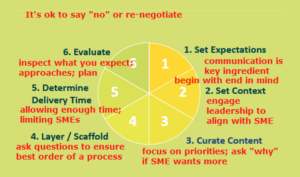Supporting SMEs—with Pizza: Professional Development Offering

In April, I enjoyed facilitating a virtual event for the Hawkeye (Iowa) Chapter of ATD. The topic was titled “Supporting SMEs—with Pizza” and trust me, pizza always gets folks’ attention! We started out voting on our favorite-looking pie from among four images. The losing choices were either too rich (appeared too difficult to digest), too visually unappealing and with unappealing ingredients (hard to stay engaged), or not enough meat (why bother?!). I carried the metaphor through the session as I shared six slices of the pie, or six practices for partnering effectively with your SME.
Here are the six practices we discussed, with a short description of each:
- Set Expectations early and often: Communicate the time, content, and other resources needed and on what schedule. Review and agree on learning objectives, the target audience, and definition of success for the learning solution.
- Set Context: Together with your SME, strive for clarity around how the topic correlates with the target audience’s job and what challenges the audience faces, as well as the knowledge and skills they need before learning about the given topic.
- Guide your SME in how to Curate Content: Keep the learning objectives front and center and keep asking the question, “Is that ‘must have’ or ‘nice to have?’ If it is not ‘must have’ but is still important, can it be provided as a reference?
- Scaffold content in a logical manner: Discuss missing steps, content “holes,” and how each topic is related to the next.
- Determine delivery time: Instructional designers are the experts in identifying the best learning modality for a given situation and estimating the necessary learning time. Provide the SME with realistic time estimates and explanations about why 2 hours-worth of course content cannot be learned in 15 minutes. Or why an 8-hour elearning course may not have the desired effect.
- Evaluate effectiveness of the learning experience. Of course, you’ll create the evaluation plans in partnership with the SME from the start of the project with questions such as “What does success look like?” and “What are the problems you are seeing and how do you know?” and “What measures are already in place?”
The group came away with many useful tips – and having regular and clear communication was the primary one! Asking a lot of questions was another, including questions about why the SME wants certain content included, questions about the best order of a process, and questions about what success looks like. One useful pointer was remembering that it’s sometimes ok and appropriate to say “no” and re-negotiate.
If you are interested in a professional development mini-workshop on this topic or others for your organization, please contact Irene Stern Frielich.


